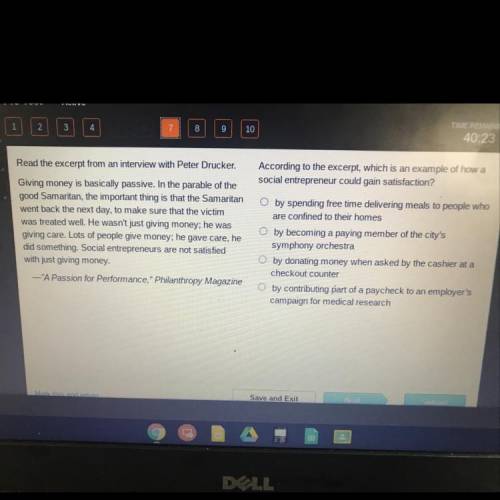
English, 02.03.2021 17:50 devenybates
Read the excerpt from an interview with Peter Drucker.
Giving money is basically passive. In the parable of the
good Samaritan, the important thing is that the Samaritan
went back the next day, to make sure that the victim
was treated well. He wasn't just giving money; he was
giving care. Lots of people give money; he gave care, he
did something. Social entrepreneurs are not satisfied
with just giving money.
--"A Passion for Performance," Philanthropy Magazine
According to the excerpt, which is an example of how a
social entrepreneur could gain satisfaction?
by spending free time delivering meals to people who
are confined to their homes
by becoming a paying member of the city's
symphony orchestra
O by donating money when asked by the cashier at a
checkout counter
O by contributing part of a paycheck to an employer's
campaign for medical research


Answers: 3


Another question on English

English, 21.06.2019 18:30
Read the excerpt below from "letter from birmingham jail" and then answer the question below: "my citing the creation of tension as part of the work of the nonviolent resister may sound rather shocking. but i must confess that i am not afraid of the word "tension." i have earnestly opposed violent tension, but there is a type of constructive, nonviolent tension which is necessary for growth. just as socrates felt that it was necessary to create a tension in the mind so that individuals could rise from the bondage of myths and half truths to the unfettered realm of creative analysis and objective appraisal, so must we see the need for nonviolent gadflies to create the kind of tension in society that will men rise from the dark depths of prejudice and racism to the majestic heights of understanding and brotherhood." how does king's repetition of the term "tension" impact the meaning of the text? question 5 options: dr. king says that he is afraid of the word tension and he doesn't think it is necessary. dr. king repeats the word tension to explain how he sees the word as a negative force that discourages change. dr. king repeats the word tension unintentionally, and it doesn't impact the meaning of the text. dr. king repeats the word tension to support how he views the word tension as positive and growth-producing.
Answers: 1

English, 21.06.2019 19:00
30 points! : ) also! question number two! analyze the connection mlk makes between the emancipation proclamation and the current situation african americans were experiencing. a; martin luther king was speaking about the need to free african americans from slavery, just like abraham lincoln did years ago. b; martin luther king makes the point that 100 years after slaves were freed by the emancipation proclamation, they are not truly free due to continued segregation. c; martin luther king thought life was going very well for african americans, and no further action needed to be taken. he showed extreme gratitude to abraham lincoln. d; martin luther king expressed extreme anger towards abraham lincoln for not ending segregation.
Answers: 2

English, 22.06.2019 03:00
How can you avoid the problem of groupthink? a. by choosing a group leader to direct the group b. by composing the team of only like-minded individuals c. by encouraging all members to voice their opinions d. by keeping quiet when you disagree with another group member's opinion
Answers: 1

English, 22.06.2019 04:50
Read the passage, then answer the question that follows. no one could have seen it at the time, but the invention of beet sugar was not just a challenge to cane. it was a hint—just a glimpse, like a twist that comes about two thirds of the way through a movie—that the end of the age of sugar was in sight. for beet sugar showed that in order to create that perfect sweetness you did not need slaves, you did not need plantations, in fact you did not even need cane. beet sugar was a foreshadowing of what we have today: the age of science, in which sweetness is a product of chemistry, not whips. in 1854 only 11 percent of world sugar production came from beets. by 1899 the percentage had risen to about 65 percent. and beet sugar was just the first challenge to cane. by 1879 chemists discovered saccharine—a laboratory-created substance that is several hundred times sweeter than natural sugar. today the sweeteners used in the foods you eat may come from corn (high-fructose corn syrup), from fruit (fructose), or directly from the lab (for example, aspartame, invented in 1965, or sucralose—splenda—created in 1976). brazil is the land that imported more africans than any other to work on sugar plantations, and in brazil the soil is still perfect for sugar. cane grows in brazil today, but not always for sugar. instead, cane is often used to create ethanol, much as corn farmers in america now convert their harvest into fuel. –sugar changed the world, marc aronson and marina budhos how does this passage support the claim that sugar was tied to the struggle for freedom? it shows that the invention of beet sugar created competition for cane sugar. it shows that technology had a role in changing how we sweeten our foods. it shows that the beet sugar trade provided jobs for formerly enslaved workers. it shows that sweeteners did not need to be the product of sugar plantations and slavery.
Answers: 1
You know the right answer?
Read the excerpt from an interview with Peter Drucker.
Giving money is basically passive. In the pa...
Questions



Mathematics, 02.07.2020 22:01


Health, 02.07.2020 22:01

Mathematics, 02.07.2020 22:01

History, 02.07.2020 22:01



History, 02.07.2020 22:01

Mathematics, 02.07.2020 22:01

Mathematics, 02.07.2020 22:01

English, 02.07.2020 22:01



Mathematics, 02.07.2020 22:01

Mathematics, 02.07.2020 22:01


Mathematics, 02.07.2020 22:01

Social Studies, 02.07.2020 22:01



